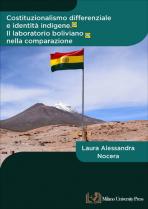Costituzionalismo differenziale e identità indigene: Il laboratorio boliviano nella comparazione
Synopsis
The book aims to reconstruct, with a interdisciplinary approach in a comparative methodology, the evolution of Bolivian institutions, from independence to the present days, in the light of the indigenous element as a legal interpretative parameter. After a first denial and a forced assimilation, the indigenous element was integrated into the institutions until it became central to the construction of an alternative constitutionalism to the Western model. The dissertation outlines three Latin American constitutional cycles. For each constitutional cycle, the common lines and the differences with Western constitutionalism are analysed, referring to the importance attributed to the indigenous element, since to a detailed analysis of intercultural and multinational constitutionalism of the 2009 Bolivian constitution. The indigenous element is fundamental because it becomes a source of national law, thus giving rise to a plural juridical model that starts from the community, and the traditional and ancestral culture of the indigenous people. It also challenges the Western individual constitutionalism, only founded on the supremacy of human rights.
Downloads


This work is licensed under a Creative Commons Attribution-ShareAlike 4.0 International License.
